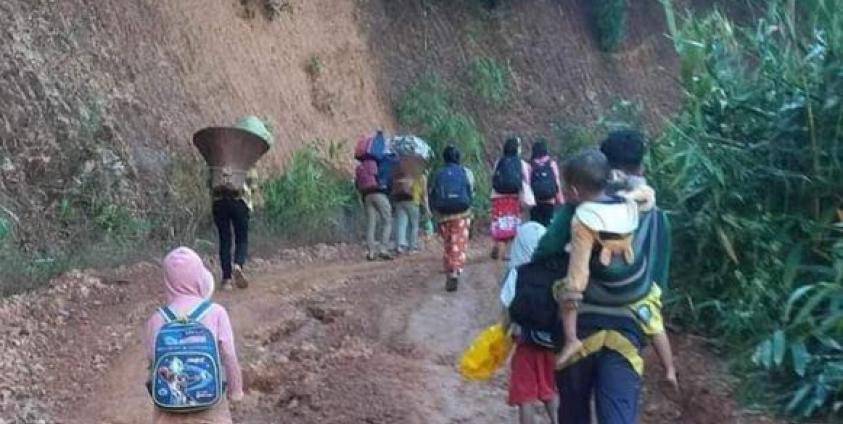The Military Council's 2021 coup plunged Myanmar into economic recession, exacerbating daily livelihood hardships for the entire population, and leading to a surge in conflict-driven displaced people.
Chin State, situated on the northwest frontier of Myanmar, bears the brunt of the aftermath of the coup, with its population facing severe hardships. Threats of landmines and unexploded ordnance deter farmers from going to farmlands, while Junta-imposed travel restrictions to block and disrupt the flow of food supplies and goods. Essential vaccinations remain inaccessible to local children, and another big concern lies in the suppression of freedom of religion and faith.
Covering an area of just 36,019 square kilometers, Chin State had a population of 47,8801 according to the 2014 census. Since the 2021 coup, the region has witnessed a steady rise in the number of people displaced by conflict, reaching 101,658 after three years.
Despite Chin State's abundant arable land exceeding 100,000 acres, conflicts arising post-coup resulted in the cultivation of only approximately 45,000 acres for rainy season rice during the 2022-23 planting season.
 The food security situation in Chin State is critical, marked by disruptions in hillside farming and other food production sectors. Dr. Wong Hsun Htan, the Chin State Chief Minister appointed by the Military Council, has admitted that the overall food security in Chin State averages below 50 percent, with Tedim Township facing an even more dire situation at 60 percent.
The food security situation in Chin State is critical, marked by disruptions in hillside farming and other food production sectors. Dr. Wong Hsun Htan, the Chin State Chief Minister appointed by the Military Council, has admitted that the overall food security in Chin State averages below 50 percent, with Tedim Township facing an even more dire situation at 60 percent.
The neighboring Sagaing and Magway regions, primarily responsible for supplying food to Chin State, are also entangled in ongoing armed conflicts, hampering agricultural activities. Consequently, food shortages have intensified, with the prices of essential food items for rice, beans, and sesame skyrocketing threefold compared to pre-coup levels.
Geographically isolated, Chin State has limited travel routes, and with the placement of landmines near these few roads, the lives and livelihoods of its residents are under constant daily threat.
Prior to the coup, Chin State enjoyed relative peace compared to other parts of Myanmar. Words like: landmines, artillery shells, and mortar rounds were unfamiliar to the local community, as conflicts were nonexistent in the area. However since the coup, the escalation of fighting in Chin State has led to a surge in casualties caused by lethal ordnances.
The Chin Human Rights Organization (CHRO) reports that over 20 civilians have been killed and 37 others have sustained injuries in Chin State due to landmines throughout the post-coup period.
Another hurdle confronting Chin State in the aftermath of the coup is the healthcare sector. Pregnant women and children in Chin State are deprived of access to vital vaccinations, and war-displaced individuals encounter significant barriers in accessing healthcare support.
In the Civil Disobedience Movement (CDM), which aimed to defy the military dictatorship, government staffers in Chin State demonstrated the highest participation rate compared to the entire country. Among the participants, health workers constituted the second-largest group after education workers. As a consequence, the Military Council is currently limited to operating clinics and hospitals solely in urban areas, with insufficient human resources to manage healthcare facilities in rural areas.
In Myanmar, it is a regulatory requirement for children aged from birth to 18 months to receive 13 mandatory vaccines, promoting normal growth, overall health, and protection of certain infectious diseases.
Chin State holds the second-highest percentage of disabled individuals and the second-highest infant mortality rate in Myanmar. The primary underlying cause of these issues, as highlighted by the United Nations International Children's Emergency Fund (UNICEF) and the Ministry of Health, stems from inadequate healthcare and nutrition for expectant mothers during pregnancy.
70 percent of Chin State's population resides in rural areas, where the areas with the least accessibility to healthcare support, also experience the highest infant mortality rates.
As time flies, three years have already elapsed since the coup, numerous children have surpassed the mandatory vaccination age limit without receiving essential vaccines, raising serious concerns about their future health prospects.
Among the troubling consequences in Chin State during the post-coup period, the rapid erosion of freedom of faith stands out. Over two years after the coup, on February 2nd, 2023, the Military Council declared martial law in seven townships in Chin State, including the state capital Hakha. Subsequently, the severe violations of the local people's freedom of faith worsened.
The Military Council enforced a ban on gatherings of more than 5 people in the townships placed under martial law. On February 13th of that year, warning letters were issued to the elders of various churches, stipulating that prior permission from the authorities must be obtained for religious worship or vigils.
90 percent of Chin State's entire population identifies as Christians. Pastors in Hakha stated that after the declaration of martial law, they encountered the cumbersome process of regularly seeking permission from authorities for weekly services. Additionally, the curfew led to the cancellation of night prayers.
CHRO reported that over 90 Christian religious schools were burned and destroyed across Chin State, and in Thantlang alone, where the entire township was devastatingly scorched, 35 schools were torched.
In Chin State, many religious structures have been reduced to ashes, prompting war-displaced individuals in rural areas to worship collectively in camps where they are taking refuge. Meanwhile, in urban areas, people gather to worship by congregating in nearby churches to avoid unnecessary problems arising from the curfew.







